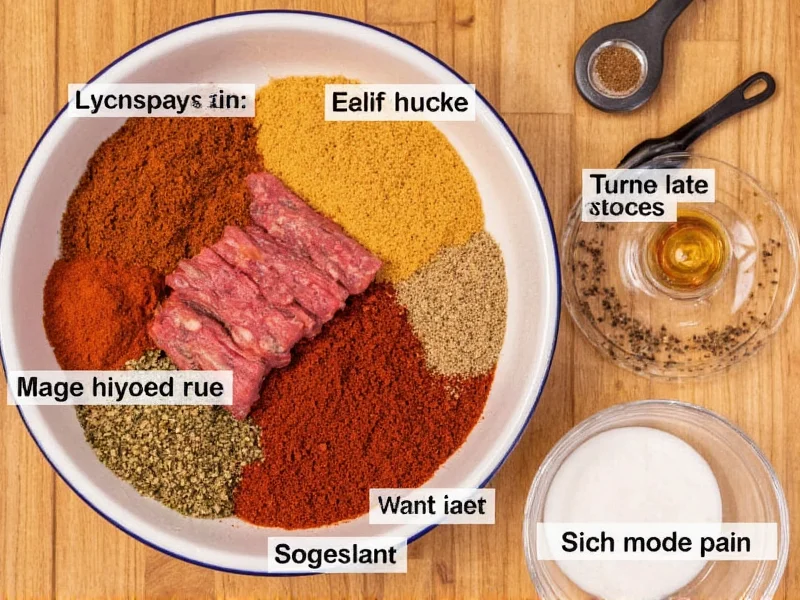Ground beef's rich, meaty flavor serves as the perfect canvas for spice combinations that enhance rather than overpower. Understanding which spices complement beef's natural umami profile transforms ordinary dishes into restaurant-quality meals. This guide details not just which spices work best, but why they work, optimal measurements, and dish-specific blends that deliver consistent results.
Why These Spices Work with Ground Beef
Ground beef contains high levels of glutamates that create savory umami notes. The right spices interact with these compounds to either amplify existing flavors or add complementary dimensions. Fat-soluble compounds in spices like cumin and paprika bind effectively with beef's fat content, while water-soluble elements in garlic and onion powders distribute evenly throughout the meat.
Essential Spice Categories for Ground Beef
Building a versatile ground beef seasoning repertoire requires understanding these fundamental categories:
| Spice Category | Key Spices | Flavor Contribution | Best Used In |
|---|---|---|---|
| Foundational | Salt, black pepper | Enhances natural meat flavors | All ground beef applications |
| Warm Spices | Paprika, cumin, coriander | Earthy depth, subtle sweetness | Tacos, chili, meatloaf |
| Herbal Notes | Oregano, thyme, rosemary | Floral, grassy complexity | Pasta sauces, stuffed peppers |
| Aromatic Enhancers | Garlic powder, onion powder | Savory-sweet background notes | All applications (avoid fresh garlic) |
| Heat Elements | Cayenne, chili powder, red pepper flakes | Controlled warmth | Tacos, sloppy joes, spicy meatballs |
Dish-Specific Spice Blends
Generic seasoning works in a pinch, but tailored blends elevate specific dishes. These tested combinations deliver authentic flavors:
Perfect Taco Seasoning (per pound of beef)
- 1½ tsp chili powder (not paprika)
- 1 tsp cumin
- ½ tsp smoked paprika
- ¼ tsp cayenne (optional)
- ½ tsp garlic powder
- ½ tsp onion powder
- 1 tsp dried oregano
- 1 tsp salt
- ½ tsp black pepper
Pro tip: Add 1 tbsp tomato paste when browning for authentic depth in your best ground beef tacos seasoning.
Italian Meat Sauce Blend (per pound)
- 1 tsp dried basil
- 1 tsp dried oregano
- ½ tsp dried rosemary
- ½ tsp red pepper flakes
- 1 tsp garlic powder
- 1 tsp onion powder
- 1 tsp fennel seeds (crushed)
- Salt and black pepper to taste
This combination creates the ideal spice ratio for ground beef in spaghetti sauce with balanced herbal notes.
Optimal Spice Measurements for Ground Beef
Over-spicing drowns beef's natural flavor, while under-spicing leaves dishes bland. Follow these professional guidelines for consistent results:
| Spice Type | Minimum per Pound | Ideal Range | Maximum Before Overpowering |
|---|---|---|---|
| Single dominant spice (cumin, paprika) | ½ tsp | ¾-1 tsp | 1½ tsp |
| Supporting spices (garlic, onion powder) | ¼ tsp | ½-¾ tsp | 1 tsp |
| Heat elements (cayenne, red pepper) | ⅛ tsp | ¼-½ tsp | ¾ tsp |
| Dried herbs (oregano, thyme) | ¼ tsp | ½-1 tsp | 1½ tsp |
When creating your homemade ground beef seasoning mix, remember that dried herbs require 20-30 minutes of cooking time to fully release their flavors. Add them early in the browning process rather than at the end.
Critical Timing for Adding Spices
The moment you add spices dramatically affects flavor development:
- Salt - Add ½ during browning, ½ near the end for optimal texture and flavor balance
- Fat-soluble spices (paprika, cumin) - Add when meat is 75% browned to toast spices in rendered fat
- Water-soluble spices (garlic, onion powder) - Add after initial browning to prevent burning
- Fresh herbs - Stir in during last 5 minutes of cooking
Avoid adding all spices at the beginning - this common mistake causes volatile flavor compounds to evaporate during cooking. For the best way to season ground beef for burgers, mix dry spices with 1 tbsp Worcestershire sauce and 1 tsp mustard powder directly into the meat before forming patties.
Common Spice Mistakes to Avoid
Even with the right spices, improper technique creates subpar results:
- Using fresh garlic instead of powder - burns easily and creates bitter notes
- Adding all salt at once - draws out moisture and creates dense, tough meat
- Over-mixing seasoned meat - develops proteins that make dishes rubbery
- Using expired spices - most ground spices lose potency after 6 months
- Not blooming spices - skipping the step of toasting spices in fat limits flavor development
Storing Spices for Maximum Flavor
Fresh spices make the biggest difference in ground beef dishes. Follow these storage guidelines:
- Keep whole spices (peppercorns, cumin seeds) in airtight containers away from light
- Grind spices immediately before use for strongest flavor
- Replace pre-ground spices every 6 months (they lose 50% potency in first 3 months)
- Store in cool, dark places - never above the stove where heat degrades quality
- Test spice freshness by rubbing between fingers and smelling - weak aroma means it's time to replace
For the most flavorful ground beef seasoning ratio, always use freshly ground black pepper rather than pre-ground. The difference in volatile oil content creates noticeably brighter flavor.











 浙公网安备
33010002000092号
浙公网安备
33010002000092号 浙B2-20120091-4
浙B2-20120091-4